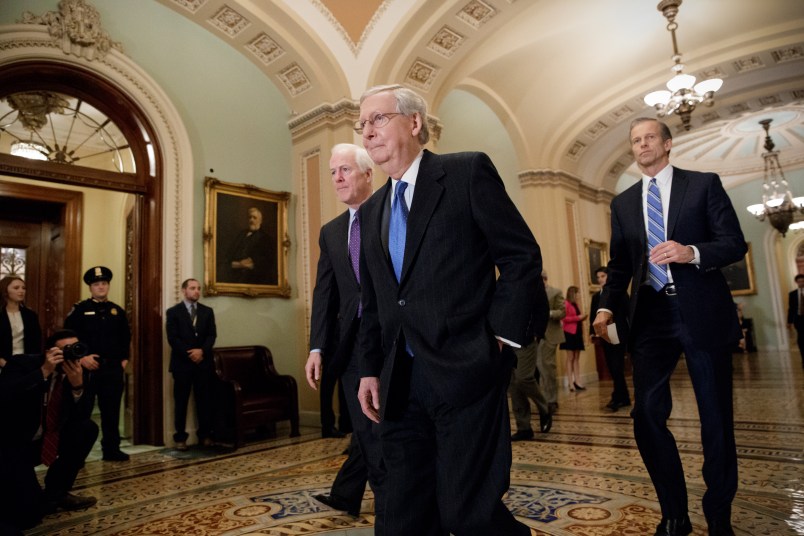President Donald Trump’s first budget proposal is full of red meat for conservatives: a massive hike in military spending paid for by deep cuts to domestic programs that are perennial targets for Republicans, such as the Environmental Protection Agency.
But one key piece of the plan has run into a buzzsaw of opposition from Republican lawmakers: a bid to slash the State Department’s funding by more than a third.
Senate Majority Leader Mitch McConnell (R-KY) bluntly told reporters this week that a budget with such cuts could “probably not” pass the Senate, and several members of his caucus confirmed to TPM that they would oppose such a move.
Sen. John McCain (R-AZ) told TPM his response to the proposed cuts is: “I don’t agree.” Asked to elaborate, McCain vehemently repeated “I don’t agree” several more times.
Trump told the nation’s governors earlier this week that his desired $54 billion increase in military spending would be “paid for by finding greater savings and efficiencies across the federal government.”
“We’re going to do more with less,” he said. “The government must learn to tighten its belt.”
Yet budget expert Stan Collander, a former top staffer on the House and Senate Budget Committees, said the cuts being floated go far beyond belt tightening.
“This is way beyond [addressing] waste, fraud and abuse,” he told TPM. “This is going to prevent departments and agencies from fulfilling their missions. This is not cutting the fat, but cutting off an arm and a leg.”
The proposal to cut 37 percent from the State Department’s budget, said Sen. Lindsey Graham (R-SC), “makes us less safe, that puts our diplomats at risk and it destroys soft power. You need soft power to win the war.”
The soft power currently at risk encompasses everything from the $30 billion spent annually on foreign aid to various public health initiatives to the thousands of Americans volunteering overseas in the Peace Corps. Several Republican lawmakers emphasized that these programs can have an outsized positive impact on relations with other countries for a relatively low investment.
“Just speaking for myself, I think the diplomatic portion of the federal budget is very important, and you get results there a lot cheaper than you do on the defense side,” McConnell said. “I’m not in favor of reducing what we call the ‘150 account‘ to that extent.”
The chair of the Senate Foreign Relations Committee, Sen. Bob Corker (R-TN), told TPM on Wednesday that he agrees. “Every general that you talk with tells you that to the extent we’re successful about diplomacy, we have less likelihood that our men and women in uniform are threatened by war,” he said. “So I understand the importance of it.”
Another Foreign Relations Committee member, Sen. Marco Rubio (R-FL), issued a strong defense of foreign aid in particular, saying it is “not charity” and calling it “critical to our national security.”
The lawmakers have joined a growing chorus of former military leaders who are sounding the alarm about the potential impacts of the proposed State Department cuts. “Many of the crises our nation faces do not have military solutions alone—from confronting violent extremist groups like ISIS in the Middle East and North Africa to preventing pandemics like Ebola,” a group of more than 100 retired generals wrote to President Trump.
Corker emphasized that Trump’s budget blueprint won’t be formally released until mid-March, and once released it will undergo significant revisions in the House and Senate before becoming law. “So I don’t have my hair on fire right now,” Corker told TPM. “This is just the beginning.”







More Trumpism “Fuck’em, Let them Die!” attitude.
To which his moronic supporters will shout with glee “Kill’em ALL and let GOD Sort them out!” while chugging down another beer.
This is why Trump “Loves the Stupid People”. They are so easy to manipulate.
Since this is where we are, I’m encouraged to see some people in the GOP Congress acting like grownups and fulfilling their function as a check on the Executive.
They aren’t going to give him carte blanche to restructure things and destroy the administrative state. They may cooperate in letting him whittle at parts of it, but lines seem to be beginning to at least be penciled in as: past here we won’t go.
Ok everyone will just spend the thread saying nasty things about the GOP and all of them are true and I agree with all of it but they are majority and we fucking need them to be a check, however inadequate, to this fucking goddamn horrible excuse for a president.
Stupid people----and reporters----are easy to manipulate, judging from the media response to Trump not tweeting for 90 minutes last night.
B-b-b-but…McConnell just informed the world that the T rump and GOP agenda are 100% exactly the same.
Very clearly, someone is lying.
Donald Jackass Trump reveals more of his incredible stupidity every day. This nightmare cannot end quickly enough.